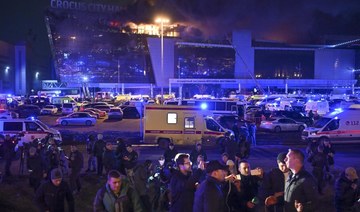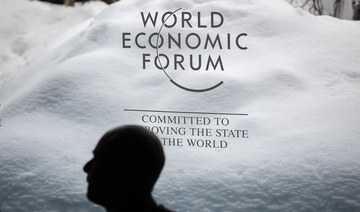Turkish President Recep Tayyip Erdoğan agreed on Tuesday with US President Donald Trump in a phone call to work closely in Libya to ensure lasting stability.
Developing...
Turkey, US agree to work to ensure ‘lasting stability’ in Libya
https://arab.news/jaucq
Anti-war protesters dig in as some schools close encampments after reports of antisemitic activity
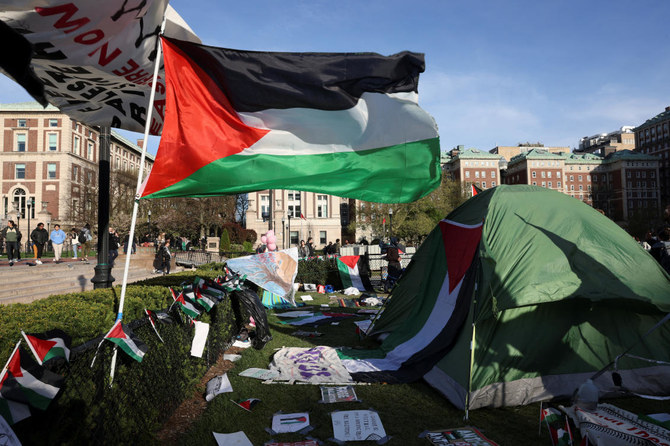
- Protesters nationwide are demanding that schools cut financial ties to Israel and divest from companies they say are enabling the conflict
- Early Saturday, police in riot gear cleared an encampment on the campus of Northeastern University in Boston while several dozen students shouted and booed at them
NEW YORK: As students protesting the Israel-Hamas war at universities across US dug in Saturday and vowed to keep their demonstrations going, some universities shut down encampments after reports of antisemitic activity among the protesters.
With the death toll mounting in the war in Gaza, protesters nationwide are demanding that schools cut financial ties to Israel and divest from companies they say are enabling the conflict. Some Jewish students say the protests have veered into antisemitism and made them afraid to set foot on campus.
Early Saturday, police in riot gear cleared an encampment on the campus of Northeastern University in Boston while several dozen students shouted and booed at them from a distance, but the scene was otherwise not confrontational.
The school said in a statement that the demonstration, which began two days ago, had become “infiltrated by professional organizers” with no affiliation to the school and protesters had used antisemitic slurs.
“We cannot tolerate this kind of hate on our campus,” the statement posted on the social media platform X said.
The University of Pennsylvania took similar action Friday when interim President J. Larry Jameson called for an encampment of protesters on the west Philadelphia campus to be disbanded, saying it violates the university’s facilities policies.
The “harassing and intimidating comments and actions” by some protesters violate the school’s open expression guidelines as well as state and federal law, Jameson said, and vandalism of a statue with antisemitic graffiti was “especially reprehensible and will be investigated as a hate crime.”
“I am deeply saddened and troubled that our many efforts to respectfully engage in discourse, support open expression, and create a community that is free of hate and inclusive for everyone have been ignored by those who choose to disrupt and intimidate,” he said.
At Columbia University, where protesters have inspired pro-Palestinian demonstrations across the country, negotiations continued with those at the student encampment.
The university’s senate passed a resolution Friday that created a task force to examine the administration’s leadership, which last week called in police in an attempt to clear the protest, resulting in scuffles and more than 100 arrests.
Though the university has repeatedly set and then pushed back deadlines for the removal of the encampment, the school sent an email to students Friday night saying that bringing back police “at this time” would be counterproductive.
Decisions to call in law enforcement, leading to hundreds of arrests nationwide, have prompted school faculty members at universities in California, Georgia and Texas to initiate or pass votes of no confidence in their leadership. They are largely symbolic rebukes, without the power to remove their presidents.
But the tensions pile pressure on school officials, who are already scrambling to resolve the protests as May graduation ceremonies near.
California State Polytechnic University, Humboldt, gave protesters who have barricaded themselves inside a building since Monday until 5 p.m. Friday to leave and “not be immediately arrested.” The deadline came and went. Only some of the protesters left, others doubled down. After protesters rebuffed police earlier in the week, the campus was closed for the rest of the semester.
In Colorado, police swept through an encampment Friday at Denver’s Auraria Campus, which hosts three universities and colleges, arresting about 40 protesters on trespassing charges.
Students representing the Columbia encampment said Friday that they reached an impasse with administrators and intend to continue their protest. After meetings Thursday and Friday, student negotiators said the university had not met their primary demand for divestment.
In the letter sent to Columbia students Friday night, the university’s leadership said “we support the conversations that are ongoing with student leaders of the encampment.”
Columbia’s president, Minouche Shafik, faced significant criticism from faculty Friday, but retained the support of trustees.
A report by the university senate’s executive committee, which represents faculty, found Shafik and her administration took “many actions and decisions that have harmed Columbia University.” Those included calling in police and allowing students to be arrested without consulting faculty, misrepresenting and suspending student protest groups and hiring private investigators.
Also Friday, Columbia student protester Khymani James walked back comments made in an online video in January that recently received new attention. James said in the video that “Zionists don’t deserve to live” and people should be grateful James wasn’t killing them.
“What I said was wrong,” James said in a statement. “Every member of our community deserves to feel safe without qualification.”
James, who served as a spokesperson for the pro-Palestinian encampment as a member of Columbia University Apartheid Divest, was banned from campus Friday, according to a Columbia spokesperson.
Protest organizers said James’ comments didn’t reflect their values. They declined to describe James’ level of involvement with the demonstration.
In France, students at the Paris Institute of Political Studies, which counts President Emmanuel Macron among its many famous alumni, students blocked access to a campus building and classes went online as the wave of protests reached overseas.
Police clashed with protesters Thursday at Indiana University, Bloomington, where 34 were arrested; Ohio State University, where about 36 were arrested; and at the University of Connecticut, where one person was arrested.
The University of Southern California canceled its May 10 graduation ceremony Thursday, a day after more than 90 protesters were arrested on campus. The university said it will still host dozens of commencement events, including all the traditional individual school ceremonies.
Universities where faculty members have initiated or passed votes of no confidence in their presidents include Cal Poly Humboldt, University of Texas at Austin and Emory University.
Russia says it struck Ukrainian energy plants in response to Kyiv targeting its own energy sector
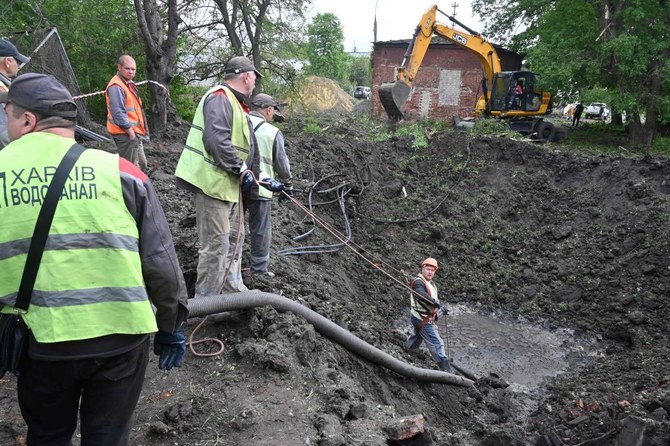
- The strikes were “in response to attempts by the Kyiv regime to damage Russian energy and industrial facilities“
- Ukraine has systematically targeted Russian oil refineries and other facilities in drone attacks in recent weeks
MOSCOW: The Russian Defense Ministry said on Saturday that its forces had carried out 35 strikes in the last week against Ukrainian energy facilities, defense factories, railway infrastructure, air defenses, and ammunition stocks.
It said in a statement that the strikes, which spanned April 20-27, were “in response to attempts by the Kyiv regime to damage Russian energy and industrial facilities.”
Ukraine has systematically targeted Russian oil refineries and other facilities in drone attacks in recent weeks, ignoring US requests not to do so.
Ukrainian officials said Russian missiles had pounded power facilities in central and western Ukraine on Saturday, increasing pressure on the ailing energy system as the country faces a shortage of air defenses despite a breakthrough in US military aid.
The Russian Defense Ministry said its campaign of strikes had been conducted using sea- and air-launched long-range precision weapons, including Kinzhal hypersonic missiles and drones.
It said it had also targeted and hit Ukrainian troop formations as well as what it described as foreign mercenaries.
Klopp and Salah involved in touchline spat during Liverpool’s draw at West Ham

- Klopp went over to speak to the Egypt winger
- Salah answered back with his arms outstretched then started to point at Klopp, who was nodding while looking out onto the field
LONDON: Liverpool manager Jurgen Klopp and star forward Mohamed Salah were involved in a touchline confrontation during the team’s 2-2 draw with West Ham in the Premier League on Saturday.
Salah was a substitute for the game and was preparing to come on shortly after Michail Antonio’s 77th-minute equalizer when Klopp went over to speak to the Egypt winger.
Salah answered back with his arms outstretched then started to point at Klopp, who was nodding while looking out onto the field. Darwin Nunez, who was also about to enter as a sub, got in between Salah and Klopp and pushed away his teammate.
Klopp refused to divulge the reason behind the spat.
“No, we already spoke in the dressing room,” Klopp said. “For me, that’s done.”
When Salah was asked for a comment after the game, video footage on social media showed him saying: “There’s going to be fire today if I speak.”
The 31-year-old Salah has scored in just one of his last six games and has started on the bench for two of Liverpool’s last three matches.
Klopp is leaving at the end of the season after nearly nine years in charge.
Riyadh prepares for WEF meeting on collaboration, growth and energy
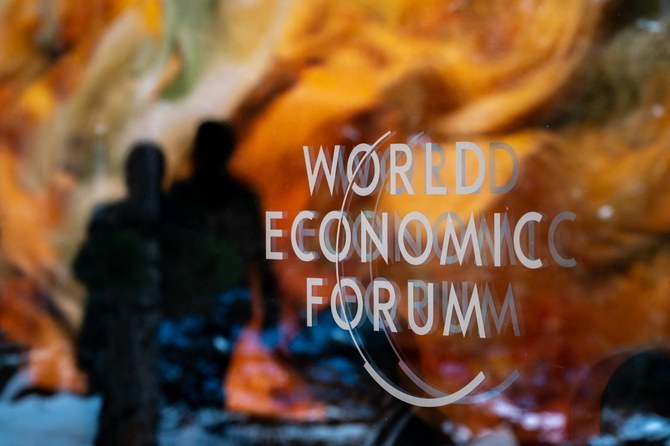
- Meeting aims to bridge growing North-South divide and find ‘collaborative solutions to shared challenges’
- Will drive ‘action-oriented dialogue’ on three key themes: Inclusive Growth, Energy for Development, and Global Collaboration
RIYADH: Around 1,000 leaders from 92 countries will convene in Riyadh for the World Economic Forum’s Special Meeting on Global Collaboration, Growth and Energy for Development on Sunday and Monday.
Building on the inaugural Growth Summit in Switzerland last year, the Riyadh meeting will, according to the WEF, “promote forward-thinking approaches to interconnected crises, while remaining realistic about shorter-term trade-offs” and “work to bridge the growing North-South divide on issues such as emerging economic policies, the energy transition and geopolitical shocks.”
Børge Brende, WEF’s President said in a press release: “With geopolitical tensions and socio-economic disparities deepening divides globally, international collaboration and purposeful dialogue has never been more urgent.”
The special meeting, held under the patronage of Crown Prince Mohammed bin Salman, provides an opportunity for leaders, according to Brende, to “turn ideas into action and unlock scalable solutions to the many interconnected challenges being faced.”
Saudi Economy and Planning Minister Faisal Al-Ibrahim said in the release: “At this global inflection point, revitalizing international collaboration has never been more important. In Saudi Arabia, the World Economic Forum has chosen an established and dynamic global platform for thought leadership, solutions and action, as the host of a critical meeting at such a critical moment.
“We are working to ensure that progress for one part of the world does not come at the expense of another. And we are committed to meeting this moment with a determination to co-author a shared future that is secure, stable and sustainable,” he continued.
The event’s three themes are: ‘A Compact for Inclusive Growth,’ ‘Catalyzing Action on Energy for Development,’ and ‘Revitalizing Global Collaboration.’
Participants will include Mishal Al-Ahmad Al-Jaber Al-Sabah, the Emir of Kuwait; Egyptian Prime Minister Mostafa Kamal Madbouly; Iraqi Prime Minister Mohammed Shia Al-Sudani; Bisher Al-Khasawneh, Jordan’s Prime Minister; Malaysian PM Anwar Ibrahim, Pakistani PM Shehbaz Sharif; Palestinian president Mahmoud Abbas; Qatari PM Mohammed Bin Abdulrahman Al-Thani; US Secretary of State Antony Blinken; Josep Borrell, High Representative of the European Union for Foreign Affairs and Security Policy; Stéphane Séjourné, French minister for Europe and foreign affairs; Annalena Baerbock, Germany’s federal minister of foreign affairs; David Cameron, UK secretary of state for foreign, Commonwealth and development affairs; Kristalina Georgieva, managing director of the International Monetary Fund; UN Senior Humanitarian and Reconstruction Coordinator for Gaza Sigrid Kaag; and World Health Organization Director-General Tedros Adhanom Ghebreyesus.
‘The audacity’: German envoy’s speech disrupted by pro-Palestinian protester at Lahore rights conference
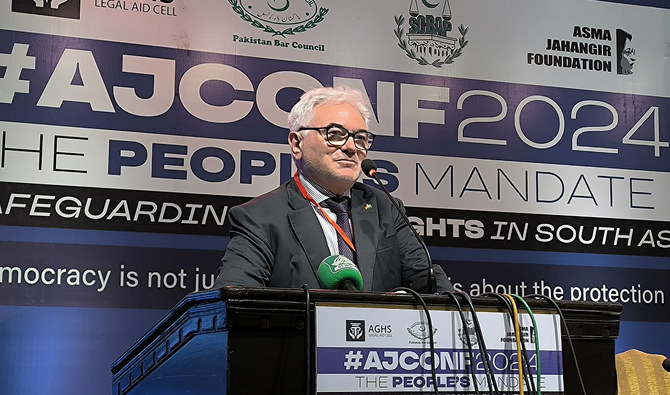
- Ambassador Grannas was speaking on safeguarding civil rights in South Asia when his speech was interrupted
- The protester said Germany was ‘brutally abusing’ those speaking in favor of the rights of Palestinian people
ISLAMABAD: German Ambassador to Pakistan Alfred Grannas was challenged by a pro-Palestine protester on Saturday shortly after he began his speech on safeguarding civil rights in South Asia at a high-profile conference held in the eastern city of Lahore.
Germany has clearly sided with Israel since the beginning of the war in Gaza after a surprise attack was launched by Hamas on Oct. 7 as a response to the deteriorating Palestinian condition living under Israeli occupation.
The conflict, which has led to the killing of over 34,000 Palestinians, has led to widespread criticism of the Israeli government, leading to protests in different parts of the world.
While countries like South Africa have accused the Jewish state of committing genocide in Gaza, authorities in Germany have forcibly removed protest encampments and gone into people’s houses to arrest them for critical social media posts on charges of antisemitism.
“I am shocked by the audacity that you are here to talk about civil rights while your country is brutally abusing the people speaking for the rights of the Palestinians,” the young protester standing at the back of the hall shouted at him.
Many people around him supported him by shouting “Free, Free Palestine” and “From the River to the Sea.”
The German envoy, who looked visibly agitated by the development, responded by shouting back and pointing to the exit.
“If you, if you want to shout, go out,” he said. “There you can shout. Because shouting is not a discussion.”
The incident happened at the Asma Jahangir Conference that focuses on dialogue and advocacy for human rights issues in Pakistan and its broader neighborhood.
Last year in November, a Pakistani classical dancer and human rights activist Sheema Kermani raised slogans for a ceasefire at a British Deputy High Commission event in Karachi and later complained of being “escorted out.”







